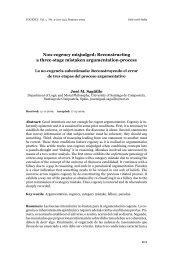Cogency v2 n2
Cogency v2 n2
Cogency v2 n2
You also want an ePaper? Increase the reach of your titles
YUMPU automatically turns print PDFs into web optimized ePapers that Google loves.
COGENCY Vol. 2, N0. 2, Spring 2010<br />
of the sort of intellectual openness and critical spirit that <strong>Cogency</strong> precisely<br />
wishes to promote. Though the interpretation of the picture given above is<br />
suggestive of a sort of solipsism, it is not out of the Wittgensteinian spirit to<br />
observe that perhaps the only way to have this openness is by participating<br />
deeply in the social and cultural environment. If we are to reach understanding<br />
then we must listen to, read and discuss ideas with others, in whatever<br />
settings in which we may find those ideas on offer. Certainly Wittgenstein<br />
himself was enmeshed within the social world of Cambridge philosophy.<br />
Malcolm (1962: 33) demonstrates what has been said here showing the genesis<br />
of On Certainty and Wittgenstein’s deep concern with others’ opinions:<br />
5 “In 1939, G. E. Moore read a paper to the Moral Science Club on an<br />
evening when Wittgenstein did not attend. Moore was attempting to prove<br />
in his paper that a person can know that he has such and such a sensation,<br />
e.g. pain. This was in opposition to the view, originating with<br />
Wittgenstein, that the concepts of knowledge and certainty have no application<br />
to one’s sensations (see Philosophical Investigations, § 246).<br />
Wittgenstein subsequently heard about Moore’s paper and reacted like a<br />
war-horse. He came to Moore’s at-home, on the following Tuesday. G.<br />
H. von Wright, C. Lewy, Smythies and myself were there, and perhaps<br />
one or two others. Moore re-read his paper and Wittgenstein immediately<br />
attacked it. He was more exited than I ever knew him to be in a<br />
discussion. He was full of fire and spoke rapidly and forcefully. He put<br />
questions to Moore but frequently did not give Moore a chance to answer.<br />
This went on for at least two hours, with Wittgenstein talking almost<br />
continuously, Moore getting in a very few remarks, and scarcely a<br />
word said by anyone else. Wittgenstein’s brilliance and power were impressive<br />
and even frightening.”<br />
Despite Malcolm’s overenthusiastic narrative, what is clear is that Wittgenstein<br />
was entrenched with his colleagues, friends and Cambridge’s intellectual<br />
rhythm. If he influenced others within his community, as he most certainly<br />
5<br />
It could be said that On Certainty is that epistemological essay Wittgenstein’s that<br />
partially responds to Moore’s conception of knowledge, the existence of an external world<br />
and the idea of argument.<br />
10








